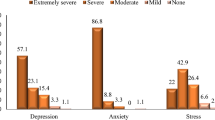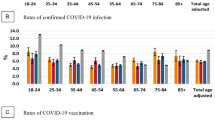Abstract
New-onset psychiatric disorders are frequent after COVID-19. We aim to determine whether acute COVID-19 severity markers can predict post-COVID new-onset psychiatric disorders. We conducted an electronic health records (EHR) cohort study of patients hospitalized for COVID-19 and without any known history of psychiatric disorders. Patients were included between January 2020 and September 2022 in one of the 36 university hospitals of the Assistance Publique - Hôpitaux de Paris. Acute COVID-19 clinical and biological severity markers were recorded during hospitalization for COVID-19. Psychiatric ICD-10 diagnoses were recorded up to 2 years and 9 months after hospitalization for COVID-19. Predictors of post-COVID new-onset psychiatric disorders were identified based on Cox regression models and sensitivity analyses. Predictive scores were built and tested in age- and sex-stratified populations. A total 34,489 patients hospitalized for COVID-19 were included; 3717 patients (10.8%) had at least one post-COVID new-onset psychiatric disorder. Hospital stay >7 days (HR = 1.72, 95%CI [1.59–1.86], p < 0.001), acute delirium (HR = 1.49, 95%CI [1.28–1.74], p < 0.001), elevated monocyte count (HR = 1.14, 95%CI [1.06–1.23], p < 0.001) and elevated plasma CRP (HR = 0.92, 95%CI [0.86–0.99], p = 0.04) independently predicted post-COVID new-onset psychiatric disorders. Sensitivity analyses confirmed hospital stay >7 days, acute delirium, and elevated monocyte count as predictors. Predictive scores based on these variables had good 12-month positive predictive values, up to 7.5 times more accurate than random in women < 65 years. In conclusion, hospital stay >7 days, acute delirium, and elevated monocyte count during acute COVID-19 predict post-COVID new-onset psychiatric disorders.
This is a preview of subscription content, access via your institution
Access options
Subscribe to this journal
Receive 12 print issues and online access
$259.00 per year
only $21.58 per issue
Buy this article
- Purchase on SpringerLink
- Instant access to the full article PDF.
USD 39.95
Prices may be subject to local taxes which are calculated during checkout




Similar content being viewed by others
Data availability
Data from the AP-HP Health Data Warehouse (“Entrepot de données de santé”) can be obtained with permission at https://eds.aphp.fr/.
References
CDC. COVID Data Tracker. Centers for Disease Control and Prevention. 2020. https://covid.cdc.gov/covid-data-tracker.
COVID-19 Mental Disorders Collaborators. Global prevalence and burden of depressive and anxiety disorders in 204 countries and territories in 2020 due to the COVID-19 pandemic. Lancet. 2021;398:1700–12.
Taquet M, Geddes JR, Husain M, Luciano S, Harrison PJ. 6-month neurological and psychiatric outcomes in 236 379 survivors of COVID-19: a retrospective cohort study using electronic health records. Lancet Psychiatry. 2021;8:416–27.
Xie Y, Xu E, Al-Aly Z. Risks of mental health outcomes in people with Covid-19: cohort study. BMJ. 2022;376:e068993.
Clift AK, Ranger TA, Patone M, Coupland CAC, Hatch R, Thomas K, et al. Neuropsychiatric ramifications of severe COVID-19 and other severe acute respiratory infections. JAMA Psychiatry. 2022. https://doi.org/10.1001/jamapsychiatry.2022.1067.
Nersesjan V, Christensen RHB, Kondziella D, Benros ME. COVID-19 and risk for mental disorders among adults in Denmark. JAMA Psychiatry. 2023;80:778–86.
North CS, Sorg EM, Youn S, Chu JT. Case 28-2021: A 37-year-old woman with Covid-19 and suicidal ideation. N Engl J Med. 2021;385:1125–32.
Taquet M, Sillett R, Zhu L, Mendel J, Camplisson I, Dercon Q, et al. Neurological and psychiatric risk trajectories after SARS-CoV-2 infection: an analysis of 2-year retrospective cohort studies including 1 284 437 patients. Lancet. Psychiatry. 2022;9:815–27.
Xie Y, Bowe B, Al-Aly Z. Burdens of post-acute sequelae of COVID-19 by severity of acute infection, demographics and health status. Nat Commun. 2021;12:6571.
Harrison PJ, Taquet M. Neuropsychiatric disorders following SARS-CoV-2 infection. Brain. 2023;146:2241–7.
Hall J, Myall K, Lam JL, Mason T, Mukherjee B, West A, et al. Identifying patients at risk of post-discharge complications related to COVID-19 infection. Thorax. 2021. https://doi.org/10.1136/thoraxjnl-2020-215861.
Gasnier M, Choucha W, Radiguer F, Bougarel A, Faulet T, Kondarjian C, et al. Acute objective severity of COVID-19 infection and psychiatric disorders 4 months after hospitalization for COVID-19. J Clin Psychiatry. 2021;83:21br14179.
Mazza MG, De Lorenzo R, Conte C, Poletti S, Vai B, Bollettini I, et al. Anxiety and depression in COVID-19 survivors: role of inflammatory and clinical predictors. Brain Behav Immun. 2020;89:594–600.
Huang L, Yao Q, Gu X, Wang Q, Ren L, Wang Y, et al. 1-year outcomes in hospital survivors with COVID-19: a longitudinal cohort study. Lancet. 2021;398:747–58.
World Health Organization. ICD-10 Version: 2019. 2019. https://icd.who.int/browse10/2019/en.
van Gool WA, van de Beek D, Eikelenboom P. Systemic infection and delirium: when cytokines and acetylcholine collide. Lancet. 2010;375:773–5.
Price-Haywood EG, Burton J, Fort D, Seoane L. Hospitalization and mortality among black patients and white patients with Covid-19. N Engl J Med. 2020;382:2534–43.
Leentjens J, van Haaps TF, Wessels PF, Schutgens REG, Middeldorp S. COVID-19-associated coagulopathy and antithrombotic agents-lessons after 1 year. Lancet Haematol. 2021;8:e524–33.
Pun BT, Badenes R, Heras La Calle G, Orun OM, Chen W, Raman R, et al. Prevalence and risk factors for delirium in critically ill patients with COVID-19 (COVID-D): a multicentre cohort study. Lancet Respir Med. 2021. https://doi.org/10.1016/S2213-2600(20)30552-X.
Guan W-J, Ni Z-Y, Hu Y, Liang W-H, Ou C-Q, He J-X, et al. Clinical characteristics of coronavirus disease 2019 in China. N Engl J Med. 2020;382:1708–20.
Bein T, Grasso S, Moerer O, Quintel M, Guerin C, Deja M, et al. The standard of care of patients with ARDS: ventilatory settings and rescue therapies for refractory hypoxemia. Intensive Care Med. 2016;42:699–711.
Knight SR, Ho A, Pius R, Buchan I, Carson G, Drake TM, et al. Risk stratification of patients admitted to hospital with Covid-19 using the ISARIC WHO Clinical Characterisation Protocol: development and validation of the 4C Mortality Score. BMJ. 2020;370:m3339.
Lombardi Y, Azoyan L, Szychowiak P, Bellamine A, Lemaitre G, Bernaux M, et al. External validation of prognostic scores for COVID-19: a multicenter cohort study of patients hospitalized in Greater Paris University Hospitals. Intensive Care Med. 2021;47:1426–39.
Cheng L-L, Guan W-J, Duan C-Y, Zhang N-F, Lei C-L, Hu Y, et al. Effect of recombinant human granulocyte colony-stimulating factor for patients with coronavirus disease 2019 (COVID-19) and lymphopenia: a randomized clinical trial. JAMA Intern Med. 2021;181:71–8.
Takahashi T, Ellingson MK, Wong P, Israelow B, Lucas C, Klein J, et al. Sex differences in immune responses that underlie COVID-19 disease outcomes. Nature. 2020;588:315–20.
Pedregosa F, Varoquaux G, Gramfort A, Michel V, Thirion B, Grisel O, et al. Scikit-learn: machine learning in Python. J Mach Learn Res. 2011;12:2825–30.
RECOVERY Collaborative Group, Horby P, Lim WS, Emberson JR, Mafham M, Bell JL, et al. Dexamethasone in hospitalized patients with Covid-19. N Engl J Med. 2021;384:693–704.
RECOVERY Collaborative Group. Tocilizumab in patients admitted to hospital with COVID-19 (RECOVERY): a randomised, controlled, open-label, platform trial. Lancet. 2021;397:1637–45.
Warrington TP, Bostwick JM. Psychiatric adverse effects of corticosteroids. Mayo Clin Proc. 2006;81:1361–67.
Knight JM, Costanzo ES, Singh S, Yin Z, Szabo A, Pawar DS, et al. The IL-6 antagonist tocilizumab is associated with worse depression and related symptoms in the medically ill. Transl Psychiatry. 2021;11:58.
Charlson ME, Pompei P, Ales KL, MacKenzie CR. A new method of classifying prognostic comorbidity in longitudinal studies: development and validation. J Chron Dis. 1987;40:373–83.
Zweig MH, Campbell G. Receiver-operating characteristic (ROC) plots: a fundamental evaluation tool in clinical medicine. Clin Chem. 1993;39:561–77.
Royston P, Parmar MKB. Flexible parametric proportional-hazards and proportional-odds models for censored survival data, with application to prognostic modelling and estimation of treatment effects. Stat Med. 2002;21:2175–97.
Kessler RC, Angermeyer M, Anthony JC, De Graaf R, Demyttenaere K, Gasquet I, et al. Lifetime prevalence and age-of-onset distributions of mental disorders in the World Health Organization’s World Mental Health Survey Initiative. World Psychiatry. 2007;6:168–76.
Sivanathan L, Wunsch H, Vigod S, Hill A, Pinto R, Scales DC. Mental illness after admission to an intensive care unit. Intensive Care Med. 2019;45:1550–8.
Malhi GS, Mann JJ. Depression. Lancet. 2018;392:2299–312.
Langan C, Sarode DP, Russ TC, Shenkin SD, Carson A, Maclullich AMJ. Psychiatric symptomatology after delirium: a systematic review. Psychogeriatrics. 2017;17:327–35.
Wohleb ES, Terwilliger R, Duman CH, Duman RS. Stress-Induced neuronal colony stimulating factor 1 provokes microglia-mediated neuronal remodeling and depressive-like behavior. Biol Psychiatry. 2018;83:38–49.
Varvel NH, Neher JJ, Bosch A, Wang W, Ransohoff RM, Miller RJ, et al. Infiltrating monocytes promote brain inflammation and exacerbate neuronal damage after status epilepticus. Proc Natl Acad Sci USA. 2016;113:E5665–74.
Sørensen NV, Frandsen BH, Orlovska-Waast S, Buus TB, Ødum N, Christensen RH, et al. Immune cell composition in unipolar depression: a comprehensive systematic review and meta-analysis. Mol Psychiatry. 2023;28:391–401.
Kratofil RM, Shim HB, Shim R, Lee WY, Labit E, Sinha S, et al. A monocyte-leptin-angiogenesis pathway critical for repair post-infection. Nature. 2022;609:166–73.
Mazza MG, Palladini M, De Lorenzo R, Magnaghi C, Poletti S, Furlan R, et al. Persistent psychopathology and neurocognitive impairment in COVID-19 survivors: effect of inflammatory biomarkers at three-month follow-up. Brain Behav Immun. 2021;94:138–47.
Bourgeois JA, Kremen WS, Servis ME, Wegelin JA, Hales RE. The impact of psychiatric diagnosis on length of stay in a university medical center in the managed care era. Psychosomatics. 2005;46:431–39.
Mehta S, Cook D, Devlin JW, Skrobik Y, Meade M, Fergusson D, et al. Prevalence, risk factors, and outcomes of delirium in mechanically ventilated adults. Crit Care Med. 2015;43:557–66.
Acknowledgements
Data used in preparation of this article were obtained from the AP-HP Covid CDW Initiative database. A complete listing of the members can be found at: (https://eds.aphp.fr/covid-19).
Funding
The funder of the study had no role in study design, data collection, data analysis, data interpretation, or writing of the manuscript.
Author information
Authors and Affiliations
Contributions
MG conceptualized the study, set up the methodology, write the original manuscript. PP set up the methodology, made the statistical analysis, reviewed the manuscript. NB set up the methodology, made the statistical analysis, reviewed the manuscript. CAT made the statistical analysis, reviewed the manuscript. LB set up the methodology, reviewed the manuscript. BF set up the methodology, reviewed the manuscript. EC set up the methodology, reviewed the manuscript. RC conceptualized the study, set up the methodology, reviewed the manuscript.
Corresponding author
Ethics declarations
Competing interests
Bruno Falissard has been a consultant or speaker for Abbvie, Actelion, Allergan, Almirall, Alnylam, Amgen, Astellas, Astrazeneca, Bayer, Biogen, Biopecs, Bioproject, Biotronik, BMS, Boehringer, Celgène, Daiichi-Sankyio, Ethypharm, Forestlab, Genevrier, Genzyme, Gilead, Grünenthal, GSK, Idorsia, IMS, Indivior, IQVIA, JNJ, Léo, Lilly, Lundbeck, Menarini, MSD, Novartis, Novonordisk, Otsuka, Pfizer, Pierre-Frabre, Recordati, Roche, SANOFI, Servier, Takeda, UCB, ViiV, and Wellmera outside the submitted work. Laurent Becquemont has been a speaker Sanofi Genzyme out of the submitted work. Matthieu Gasnier, Pierre Pinson, Emmanuelle Corruble, Nathanaël Beeker, Camille Truong-Allie and Romain Colle have no conflict of interest.
Ethics approval and consent to participate
All methods were performed in accordance with the relevant guidelines and regulations. This study was approved by the Institutional Review Board of the AP-HP clinical data warehouse (“Entrepôt de Données de Santé (EDS)”, IRB number: IRB00011591). Informed consent was obtained from all participants
Additional information
Publisher’s note Springer Nature remains neutral with regard to jurisdictional claims in published maps and institutional affiliations.
Supplementary information
Rights and permissions
Springer Nature or its licensor (e.g. a society or other partner) holds exclusive rights to this article under a publishing agreement with the author(s) or other rightsholder(s); author self-archiving of the accepted manuscript version of this article is solely governed by the terms of such publishing agreement and applicable law.
About this article
Cite this article
Gasnier, M., Pinson, P., Beeker, N. et al. Acute COVID-19 severity markers predict post-COVID new-onset psychiatric disorders: A 2-year cohort study of 34,489 patients. Mol Psychiatry 30, 1329–1337 (2025). https://doi.org/10.1038/s41380-024-02739-7
Received:
Revised:
Accepted:
Published:
Version of record:
Issue date:
DOI: https://doi.org/10.1038/s41380-024-02739-7



